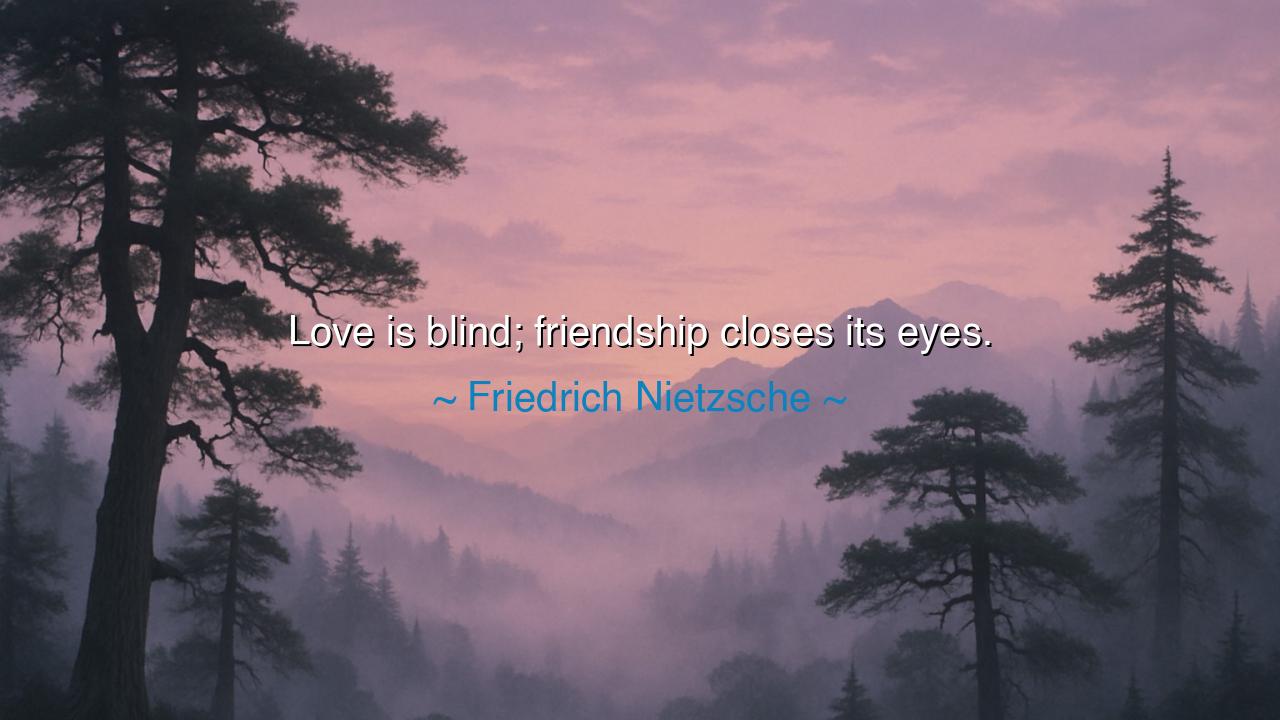
Love is blind; friendship closes its eyes.






“Love is blind; friendship closes its eyes.” Thus wrote Friedrich Nietzsche, that philosopher of fire and paradox, who sought to unmask the secret truths of the human heart. In this brief and piercing saying, he captures the delicate distinction between two of life’s greatest bonds — love and friendship — and reveals the hidden wisdom in both. Love, he says, is blind; it does not see, or refuses to see, the flaws and shadows of the beloved. But friendship, though it sees clearly, chooses to close its eyes, not from ignorance, but from mercy, understanding, and loyalty. In this contrast lies the depth of human affection — one born of passion and illusion, the other of wisdom and acceptance.
Love, in its first bloom, is a flame that consumes reason. It is a divine madness, as the ancients said, a blindness that idealizes the other until the whole world fades from view. The lover sees perfection where there is imperfection, virtue where there is weakness. Love blinds us because it demands surrender — a beautiful, dangerous surrender that makes us vulnerable and whole all at once. Nietzsche, with his sharp insight into the nature of man, knew that such blindness, though glorious, cannot last forever. The day always comes when the light returns, and the flaws once unseen are revealed. Yet in that moment of revelation, if affection survives, it transforms — from love’s blindness to friendship’s understanding.
For friendship is not blind, but gentle in its sight. It knows the truth of the other — the failures, the follies, the inconsistencies — and yet chooses to forgive. Friendship does not deceive itself; it simply decides that imperfection is not reason enough to withdraw the heart. This is what Nietzsche means when he says that friendship closes its eyes. It is the conscious act of mercy — to look upon a friend’s weakness and say, “I will not let this ruin what we share.” Where love’s blindness is born of passion, friendship’s blindness is born of wisdom. One is involuntary, the other deliberate. One dazzles; the other endures.
In the days of old, the Greeks told of Achilles and Patroclus, warriors bound not by command but by affection deeper than blood. They saw one another not through the eyes of idealized love, but through the lens of loyalty and truth. Achilles was proud, impulsive, and wrathful; Patroclus was gentle, patient, and wise. Patroclus did not deny Achilles’ flaws — he saw them, yet loved him still. And when he fell upon the field of Troy, Achilles’ rage and sorrow burned the world. It was friendship, not blindness, that bound them. Patroclus had looked upon Achilles’ faults and closed his eyes, for that is the grace of friendship — to love not because one is perfect, but because one is yours.
Nietzsche’s insight flows also from the shadows of his own life. He knew isolation, disappointment, and betrayal, and yet he valued friendship as one of the highest human virtues. He had seen how love’s fire could burn too brightly, consuming both giver and receiver, while friendship, steadier and slower, could endure the passage of time. In his solitude, he came to understand that friendship, unlike romantic love, is built upon mutual recognition — the meeting of two souls who see each other plainly and still say, “You are welcome here.” Thus, for Nietzsche, friendship becomes the higher love — not the blinding passion of youth, but the quiet, steadfast light of maturity.
This truth holds as firm in our age as in his. Love may begin in blindness — in idealization and desire — but friendship must live in the realm of truth. The one who cannot close his eyes to a friend’s faults will never know the peace of lasting companionship. For friendship is not built on perfection, but on forgiveness; not on illusion, but on trust. When you learn to look upon a friend’s mistakes and still cherish them, when you close your eyes not in denial but in compassion, you have entered the realm of true friendship — the friendship Nietzsche saw as noble, human, and divine.
Therefore, my child, take this lesson to heart: love passionately, but befriend wisely. Let love’s blindness teach you tenderness, and let friendship’s mercy teach you endurance. Seek friends who can see you fully — your virtues and your failings — and who, knowing them, still choose to stand by your side. And be that kind of friend in return. Do not demand perfection; instead, learn to close your eyes with grace, for friendship is not the art of judging but of understanding.
For in the end, love dazzles and fades, but friendship — that sacred bond of those who have learned to forgive — endures like the steady flame of a hearth against the storms of time. And perhaps that is what Nietzsche truly meant: that while love is blind by nature, friendship is merciful by choice — and in that mercy lies the highest form of love humanity can ever know.






AAdministratorAdministrator
Welcome, honored guests. Please leave a comment, we will respond soon